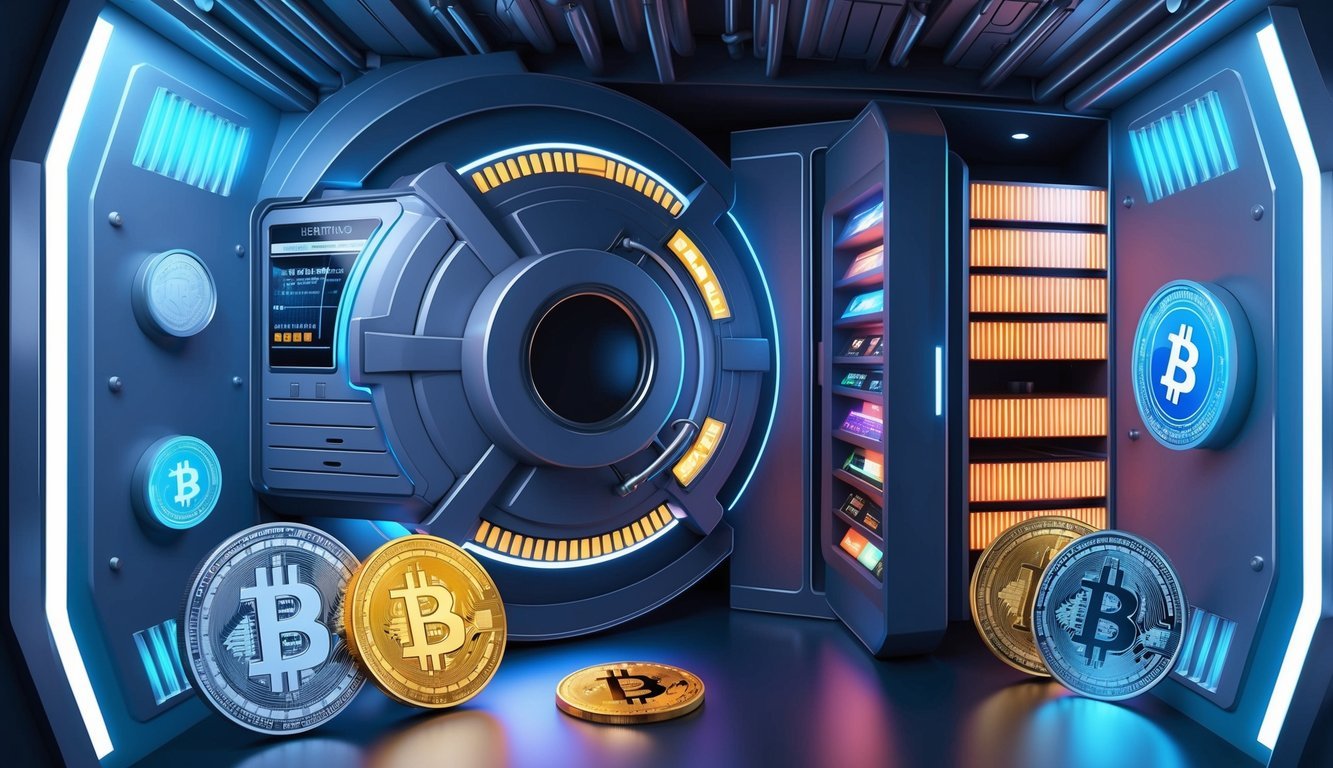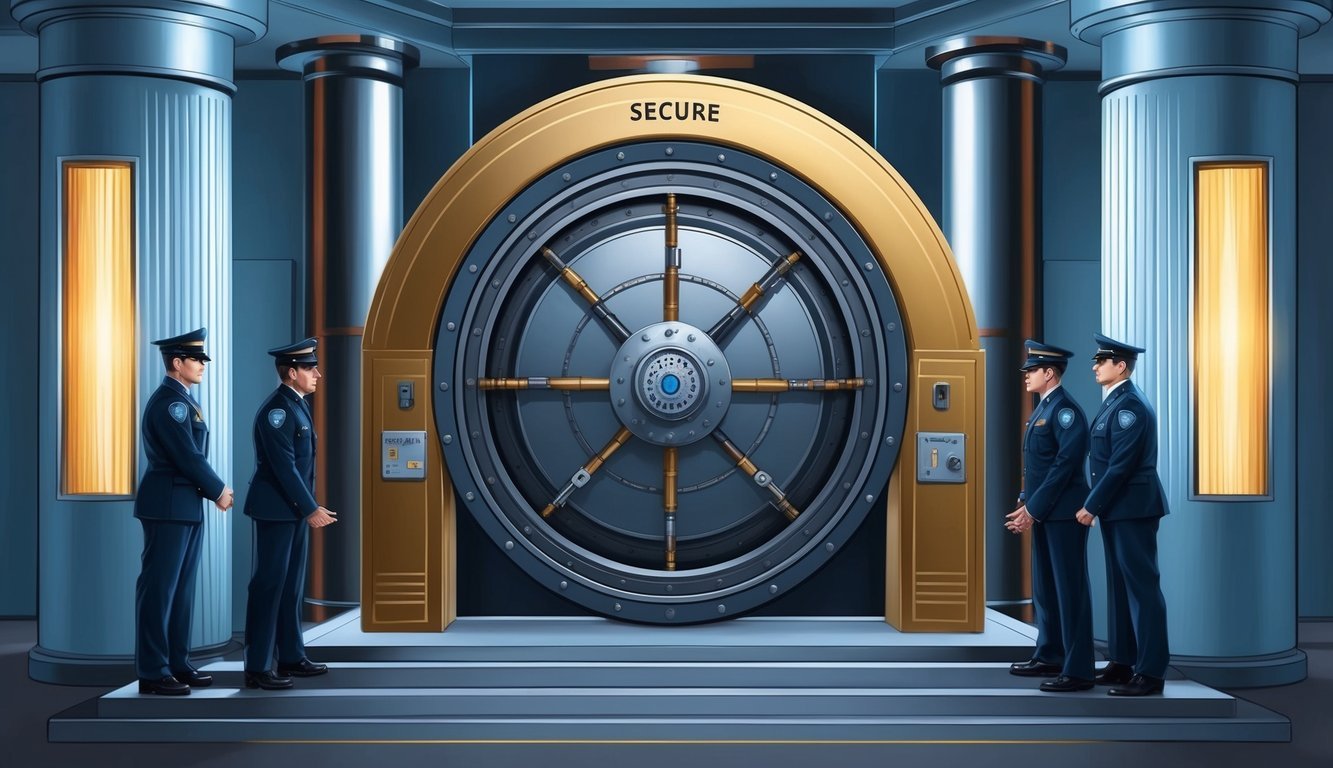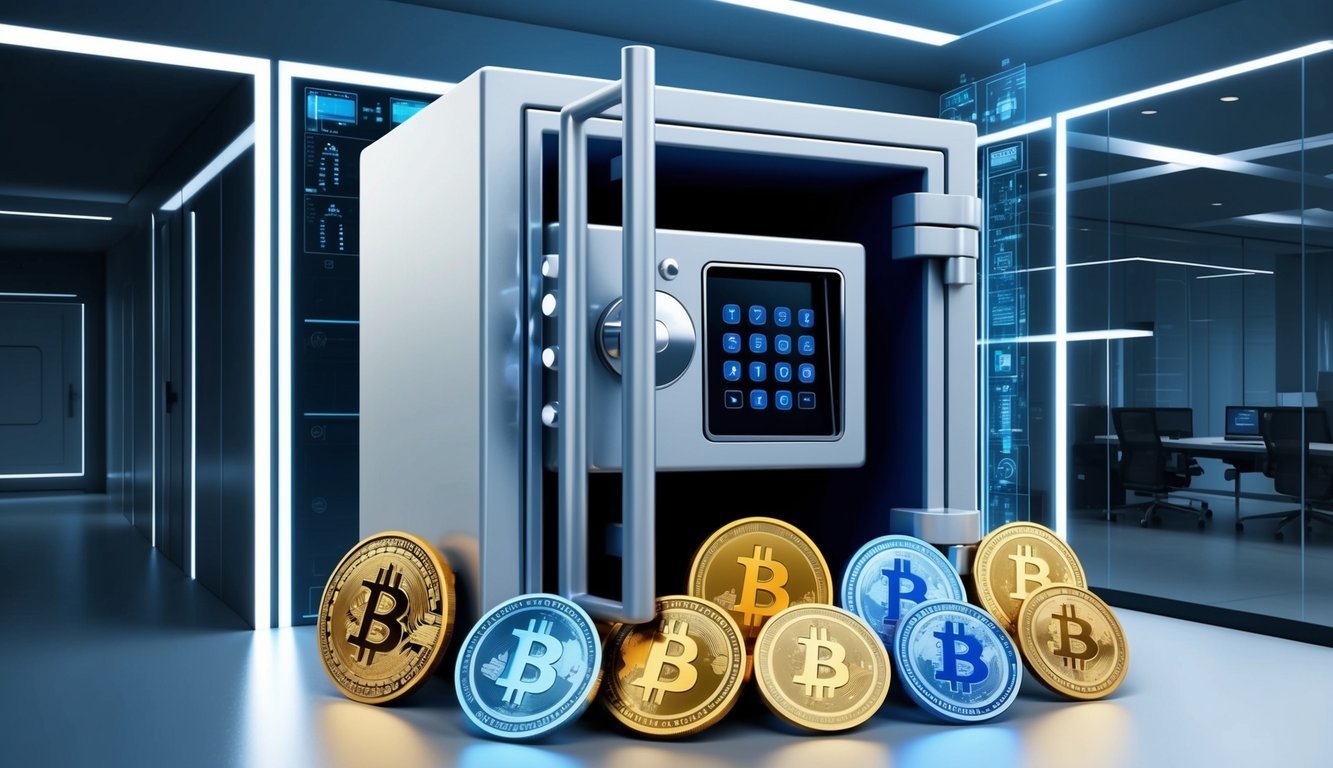Keeping your crypto safe is a big deal in today’s digital world. You’ve worked hard to get your coins, so you want to make sure they stay put. There are a few ways to do this, from online wallets to physical devices.

The safest way to store crypto is usually in a cold wallet, which is not connected to the internet.
This keeps your digital money away from online hackers. But if you need quick access to your funds, you might want to use a hot wallet instead.It’s smart to mix things up. You can keep some crypto in an easy-to-use online wallet for daily trades, and the rest in a super-safe cold storage. This way, you get both safety and ease of use. Just remember, no matter how you store your crypto, always keep your private keys secret and safe.
Key Takeaways
- Use cold storage for large amounts of crypto you don’t plan to trade soon
- Keep your private keys safe and never share them with anyone
- Use different types of wallets to balance security and convenience
Understanding Cryptocurrency Security
Keeping your crypto safe is super important. There are a few key things you need to know about how crypto storage works and the different options available.
The Basics of Crypto Storage
Your crypto is linked to a private key, which is like a password. This key lets you access and move your coins.
Never share your private key with anyone. If someone gets it, they can take your crypto.
Your wallet has a public key too. This creates your wallet address, which you can share to receive crypto.
Crypto wallets don’t actually store coins. They just hold your keys to access your crypto on the blockchain.
There are different types of wallets. Software wallets are apps on your phone or computer. Hardware wallets are physical devices that look like USB sticks.
Hot vs. Cold Storage
Hot storage means your crypto is connected to the internet. It’s easy to use but less secure.
Hot wallets include exchange accounts and most software wallets. They’re good for small amounts you use often.
Cold storage keeps your crypto offline. It’s safer but not as convenient.
Hardware wallets are the most common type of cold storage. Paper wallets are another option, but they’re trickier to use.
For large amounts, cold storage is best. You might keep some in hot storage for trading and payments.
Always back up your wallet info. Write down your recovery phrase and keep it somewhere safe offline.
Types of Crypto Wallets and Storage Solutions
Keeping your crypto safe means picking the right wallet. You have a few main options to choose from. Each type has its own pros and cons when it comes to security and ease of use.
Hot Wallets: Pros and Cons
Hot wallets stay connected to the internet. This makes them quick and easy to use for buying, selling, or trading crypto. You can access a hot wallet through your computer or phone.
But being online also makes hot wallets less secure. Hackers might try to break in and steal your crypto. Still, hot wallets work well for small amounts you use often.
Some popular hot wallets are mobile apps and browser extensions. They’re free and simple to set up. You just download the app and create an account.
Cold Wallets: Types and Benefits
Cold wallets store your crypto offline. This keeps your funds safer from online threats. There are two main types of cold wallets: hardware and paper.
Hardware wallets look like small USB drives. They’re devices made just for holding crypto. Top brands include Trezor and Ledger. These wallets cost money, but they offer strong security.
Paper wallets are free. You print out your private keys on paper. Then you store that paper in a safe place. But paper wallets can be tricky to use and easy to lose.
Comparing Hardware and Paper Wallets
Hardware wallets beat paper wallets in most ways. They’re easier to use and harder to damage. With a hardware wallet, you can send crypto by plugging it into your computer.
Paper wallets are totally offline. This makes them very secure if stored right. But using them is complex. You have to type in long codes by hand.
Hardware wallets cost money upfront. Paper wallets are free to make. But hardware wallets are worth it for large amounts of crypto.
Custodial vs. Non-Custodial Wallets
Custodial wallets are like crypto banks. A company holds your crypto for you. This is easy, but you don’t fully control your funds.
Non-custodial wallets give you full control. You manage your own private keys. This means more responsibility, but also more security.
Custodial wallets work well for beginners. They’re simple to use. But serious crypto fans prefer non-custodial options for better security.
With non-custodial wallets, you don’t have to trust a company. You alone can access your crypto. This fits the idea of decentralization that many crypto fans like.
Securing Your Digital Assets
Keeping your crypto safe is super important. You need good habits and the right tools to protect your money from bad guys. Let’s look at some key ways to lock down your digital assets.
Key Management Techniques
Your private keys are like the passwords to your crypto. You gotta keep them secret and safe. One smart move is using a hardware wallet. It’s a special device that stores your keys offline.
Always back up your seed phrase. This is a list of words that can restore your wallet if you lose it. Write it down on paper and keep it somewhere safe, like a locked drawer or safe deposit box.
Never share your private keys or seed phrase with anyone. Be careful of phishing scams that try to trick you into giving them up.
Implementing Two-Factor Authentication
Two-factor authentication (2FA) adds an extra layer of security. It’s like having a second lock on your door. When you log in, you’ll need your password plus another code.
You can use an app on your phone to get these codes. Google Authenticator and Authy are popular choices. Some places also let you use text messages, but that’s not as safe.
Turn on 2FA for all your crypto accounts. It makes it way harder for hackers to break in, even if they guess your password.
Understanding Multi-Signature Wallets
A multi-signature wallet needs more than one key to approve transactions. It’s like needing two people to turn their keys at the same time to launch a missile.
You might set it up so that you need 2 out of 3 keys to move your crypto. This way, if one key is lost or stolen, you’re not locked out of your funds.
Multi-sig is great for shared accounts or if you want extra security for your own stash. It’s a bit more complex to set up, but it can give you peace of mind for large amounts of crypto.
Best Practices for Crypto Investors

Keeping your crypto assets safe takes some work. You need to stay alert and take steps to protect your investments. Here are some key things to focus on:
Regular Software Updates and Wallet Maintenance
Always keep your crypto wallet software up to date. New updates often fix security issues. Set up auto-updates if you can.
Check your wallet regularly. Make sure all your crypto is still there. Write down any new passwords or recovery phrases.
Back up your wallet info often. Store backups in safe, separate places. Think about using a secure cloud service and a physical copy in a safe.
Avoiding Scams and Phishing Attacks
Be careful of fake websites and emails. They might try to steal your login info. Double-check web addresses before entering any details.
Don’t click links in emails about your crypto. Go to the site directly instead.
Be wary of deals that seem too good. If someone promises huge returns, it’s probably a scam.
Use strong, unique passwords for each crypto account. Turn on two-factor authentication for extra security.
Periodic Security Audits and Risk Assessment
Review your security setup every few months. Check if your methods are still safe.
Think about using a hardware wallet for large amounts. It’s safer than keeping everything online.
Spread your crypto across different wallets. Don’t keep it all in one place.
Stay informed about new security threats. Join crypto forums or follow security experts on social media.
Consider getting insurance for your crypto. Some companies now offer this.
Frequently Asked Questions

Storing crypto safely involves choosing the right wallet type and taking security precautions. Here are some common questions about protecting your digital assets.
What’s the safest type of wallet for holding crypto long-term?
For long-term storage, hardware wallets are considered the safest option. These physical devices store your private keys offline, away from potential online threats.
Hardware wallets offer strong security features and are resistant to hacking attempts. They’re ideal if you don’t plan to trade frequently.
How can I protect my cryptocurrency from hackers?
Use strong, unique passwords for all your crypto accounts. Enable two-factor authentication whenever possible.
Be cautious of phishing attempts and only use official websites and apps. Keep your software and devices updated to patch any security vulnerabilities.
What are the pros and cons of cold storage for crypto assets?
Cold storage, like hardware wallets, offers high security by keeping your crypto offline. This protects against online hacks and malware.
The downside is reduced convenience. You’ll need to connect the device to make transactions, which can be time-consuming for frequent traders.
Should I keep my crypto on an exchange or transfer it to a wallet?
For active trading, keeping some crypto on an exchange can be convenient. But for larger amounts or long-term holding, transferring to a personal wallet is safer.
Exchanges can be hacked or face other issues. Your personal wallet gives you full control over your assets.
Can cryptocurrency be stored safely offline, and if so, how?
Yes, you can store crypto offline using cold storage methods. Hardware wallets are a popular choice for offline storage.
You can also use paper wallets, which involve printing your private keys. These methods keep your crypto away from internet-connected devices.
How reliable are hardware wallets for storing crypto assets securely?
Hardware wallets are very reliable for secure crypto storage. They use advanced encryption and often require physical confirmation for transactions.
Click here to read more about the safest way to store cryptocurrency in 2024.
Top brands like Ledger and Trezor have strong reputations. Just make sure to buy directly from the manufacturer to avoid tampering.





